Spanish Rock (continued). La Frontera: On the Border of Good and Evil
Published in: 34. In Worlds and TimesLYRICAL INTRODUCTION
I was introduced to Javier Andreu and the band La Frontera through Nino Bravo. Nino Bravo (real name Luis Manuel Ferri Llopis) was the “number one voice” in Spain during the late 1960s and early 1970s. The life of this talented performer of popular songs and ballads was tragically cut short in April 1973 when he died in a car accident at the age of just 28. In 1995, popular musicians and singers from Spain gathered to record a tribute to Nino Bravo in honor of what would have been his fiftieth birthday. The idea was simple: each invited “star” chose their favorite song by the famous singer and performed it alongside him. Nino appeared on the screen in the recording while his colleague stood in front of a microphone in the studio. It made a pretty good duet.
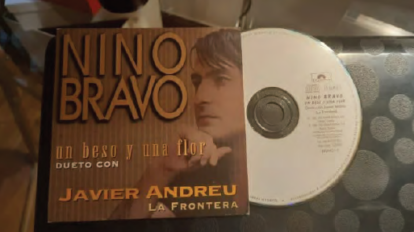
I’ve listened to a lot of Nino. I loved his voice, his style of singing, and his songs. My favorite was the lyrical (but by no means sappy) “Un beso y Una Flor” (“A Kiss and a Flower”). While searching for this song once again, I stumbled upon a recording from the 1995 tribute. An unfamiliar singer performed it alongside Nino. The credits read: Nino Bravo y Javier Andreu (La Frontera). I enjoyed the duet, and the raspy voice of the unknown singer captivated me. There was also something else that caught my attention — his passion and dedication in the performance, combined with a tender respect for the late singer.
I decided to learn more about Javier and his band. I played the first La Frontera video I found. It was a recording from a concert. The musicians didn’t look as young anymore. Javier performed in dark glasses and resembled Mike Naumenko in his later years. The song was called “El Límite” (“The Limit”). I’m not sure what struck me at that moment: the song itself, the lead singer’s voice, or his slight resemblance to Mike (or perhaps all of that together) —but I became genuinely fascinated by La Frontera. Only later did I learn that “El Límite” was the song (along with others from the album “Rose of the Winds”) that had propelled the band to stardom…
Listen closely,
my old friend:
I don’t know if you’ll remember
those times that are now lost
on the streets of this city.
We read forbidden books together,
thinking that nothing would change us,
always living waiting for a signal.
On the border of good, on the border of evil,
I will wait for you on the border of good and evil.
It’s hard to feel so downhearted
when you don’t feel pain—
It’s like plunging a knife
deep into your heart.
Listen closely, my old friend:
I will never forget our friendship.
Life is just a game
where you have to place your bets
if you want to win.
On the border of good, on the border of evil,
I will wait for you on the border of good and evil.
It’s not hard to find
paradise in the dark.
Luck sails in a boat
With no course and with no captain.
Listen closely, my old friend:
if we ever meet again,
I can just hope everything will be like it was yesterday.
On the border of good, on the border of evil,
I will wait for you on the border of good and evil.
* * *
By the mid-1980s, the famous Madrid movement (la Movida madrileña), representing the youth subculture of Spain, began to decline. New figures started to emerge in the country’s musical scene, primarily oriented toward the music of English rock bands. But into this space burst a band, like a cowboy from the American Wild West, performing a style of music that was completely atypical for Europe—country (or more precisely, country-punk) and western. This band was La Frontera.
Every generation has its heroes. Spaniards born in the 1960s grew up on American westerns, which were heavily broadcast on local television. Cowboy swagger, leather vests, revolvers, and six-shooters stirred boys’ imaginations, prompting them to emulate their film heroes. For some, this playful imitation turned into something more.
* * *
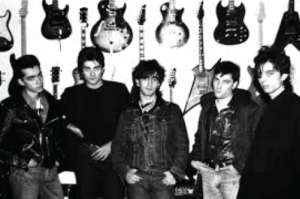
La Frontera, 1984
They started out like many others. University students would form bands and try to conquer musical Olympus. La Frontera was no exception. In 1984, a group of friends studying information sciences in Madrid came together to form a “gang.” They had already tried their hands in other bands. The group originally consisted of five members and was called Las Muñecas Repollo (“The Cabbage Dolls”). They soon changed their name, though, to La Frontera, after one of the songs from their first album. The original lineup included Javier Andreu (vocals), Tony Marmota (bass), José Bataglio (drums), Quino Maqueda (guitar), and Rafa Hernández (guitar).
Typically, a musical group has a leader (be it the vocalist, guitarist, or even the drummer) plus the rest. The leader is the bearer of the concept and, consequently, the name. Other members may change, and sometimes the lineup changes completely, but the name is almost always firmly attached to the leader. In the history of rock music, a band rarely ceases to exist after losing a member. “La Frontera” has always been a duo: vocalist and guitarist Javier Andreu plus bassist Tony Marmota, with other musicians who may change periodically.
They started out like everyone else. But what set them apart was their style. Their unique style. The band also used instruments uncommon in Spain: banjo, harmonica, and violin. Bob Dylan’s work, which greatly influenced many Spanish musicians, was another major influence. And although the audience initially approached La Frontera with some caution and mild confusion, they ultimately couldn’t resist the musicians’ powerful energy and charm, along with the incredible charisma of lead singer Javier Andreu. Javier didn’t just sing songs; he lived entire stories on stage. Duels under the sun, smugglers’ adventures, terrible revenge for betrayal, scenes from Wild West saloons where you drink whiskey and embrace “dangerous women,” then within five minutes draw your Colt and kill the villain — Javier kept playing the games of his childhood, with the others actively supporting him.
Their first records were recorded in this “cowboy” style: “The Border” (La frontera) (1985), “If the Whiskey Doesn’t Ruin You, the Women Will” (Si el whisky no te arruina, las mujeres lo harán) (1986), “Midnight Train” (Tren de medianoche) (1987).
Perhaps one of the most characteristic songs reflecting the group’s concept during that period is “Southern Sky” (Cielo del Sur). Audiences still love it, and the band often performs it at concerts.
I walk down the road,
I’m heading to the border.
What separates you and me?
The dust of dawn
That will awaken you in an old hotel.
You’ll step out when you hear the engine’s sound.
I live in a truck without wheels
On the side of the road,
A thousand kilometers away from you.
And there, where the sun hides,
Where my voice is lost,
Why am I sure I will find you?
Southern sky,
So blue,
Southern sky,
I can never forget you.
My brother advised me:
Don’t run away; that’s worse.
That was the last time he spoke.
There, again on the highway
Like a lonely wolf
Why am I following your trail?
I live in a truck without wheels
On the side of the road,
A thousand kilometers away from you.
There, where the sun hides,
Where my voice is lost,
Why am I sure I will find you?
Southern sky,
So blue
Southern sky,
I can never forget you.
* * *
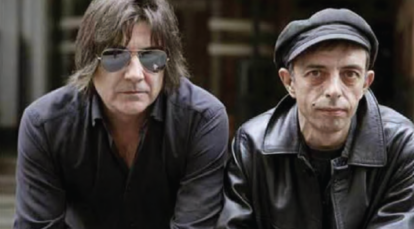
Javier Andreu and Tony Marmota, 2015
In 1989, at the personal invitation of the head of the USSR, Mikhail Gorbachev, La Frontera traveled to Moscow for a music festival featuring Eastern European countries. Not long before, Gorbachev had visited Spain, and friendly relations had developed between the two countries. The musicians accepted the invitation with enthusiasm. They knew nothing about the Soviet Union and were eager to see this vast northern land, where they thought everyone wore big fur hats. Imagine their surprise in Moscow when they encountered only one “señora” in a hat like that! Nevertheless, the young Spaniards bought fur hats as souvenirs.
On the streets, they were greeted by crowds of young people shouting, “Let’s rock and roll!” But they played country and western… Fifteen years later, Javier and Tony would laugh as they recalled that trip.
By that time, the group had grown tired of cowboy antics, and musical tastes had begun to shift. Javier became fascinated by the work of David Bowie and Nick Lowe, and La Frontera turned toward pop-rock. The result was the 1989 album “Rose of the Winds” (Rosa de los Vientos). This album brought the band widespread fame. Songs from this record were literally playing on every radio. It was a beautiful, melodic, romantic album that resonated with Spaniards, and the song “El Límite” became the band’s calling card. Among the songs on “Rosa de los Vientos” is another noteworthy track with deep philosophical meaning — “Juan Antonio Cortés.“ Thirty-five years later, Javier would say, “Juan Antonio Cortés is me.” Here, La Frontera’s work resonates once again with Nino Bravo’s legacy. “Tell me, from what country I come… the land from which I have nothing but dust from the road,” sang Nino. “I was born on a land where the sun never sets, on a land surrounded by the sea, where a scorching wind blows. I was born with nothing, so I owe you nothing… I was born here and will die on this land,” sang Javier. Here it is, the harsh land under the blazing sun. But it’s home, it’s theirs. And no matter how enticing distant lands may be, the singers understand their place is here.
I was born on a land where the sun never sets,
On a land surrounded by the sea, where a scorching wind blows.
I was born with nothing, so I owe you nothing,
Just a few details about the people I met, the people I met!
My name is Juan Antonio Cortés.
There are people who are born and live in solitude,
Who die on a pedestal, and no one mourns them.
There are people who live as if lost and worthless,
And people who ask for more.
Everyone knows this is true.
There are people who sleep and wake,
Not knowing how to distinguish dreams from reality.
There are people who stay awake,
Not knowing who waits to see their arrival.
Everyone dreams, and I am the same.
There are people who fight for ideals,
Carrying flags blown by the wind.
There are people who strive to be something more,
Not knowing when their end will come. And no, no, no…
I never offered my hand for a handshake.
My name is Juan Antonio Cortés.
I was born here and will die on this land.
There are people who die in search
Of what destiny couldn’t give.
People with malice, people without evil—
While the world spins on, without stopping, without stopping.
I never offered my hand for a handshake.
My name is Juan Antonio Cortés.
I was born here and will die on this land.
I am already old; you can see me now,
And I leave you with my blessing,
With my epitaph, which I will write in blood,
And from my wine-colored hole, I will say to you: farewell! Farewell!
I never offered my hand for a handshake.
My name is Juan Antonio Cortés.
I was born here and will die on this land.
* * *
In the early 1990s, La Frontera was at the peak of its popularity. The 1991 album “Fiery Words” (Palabras de fuego) also enjoyed success. The song “Wild Wind” (Viento Salvaje) from this album formed a sort of continuation of the theme of “Cielo del Sur.”
In 1992, the album “Captured Alive” (Capturados Vivos) was released. It was recorded during a concert the band performed at Sony Plaza during the Expo92 exhibition in Seville. It included their greatest hits, born throughout the existence of La Frontera. This was followed by a two-year tour across the country, albeit without Quino Maqueda, who had left the band.
Everything was going well, but in the 1990s, the musical landscape saw the rise of grunge, which emerged from punk rock and heavy metal. This posed a challenge for bands playing different styles. In 1994, La Frontera released a new album recorded in London — “The Wheel of Sharp Weapons” (La rueda de las armas afiladas). Responding to the trends of the time, the album had a rather harsh sound. In some tracks, Javier’s raspy voice was pushed to its limits. The band’s lineup changed; now there were four members: guitarist Javier Pedreira, drummer Mario Carrión, and of course, the inseparable Javier Andreu and Tony Marmota. It’s worth noting that La Frontera has always been lucky with musicians, especially guitarists. Each has had a unique playing style that’s fit a particular period in the band’s evolution. Yet the new album didn’t match its predecessors’ success, and the band went back to performing live.
Personally, I enjoy this album just as much as the earlier ones. It is quite diverse, with hard, noisy tracks interspersed with lyrical ballads, such as “The Ghost of the Attic” (El Fantasma Del Desván) or even the psychedelic piece “Sands of Samarkand” (Arenas De Samarkanda). Javier Pedreira’s guitar sounds just as virtuosic and expressive as Javier the singer’s.
* * *
The period from the late 1990s to the early 2000s was a crisis for many bands. La Frontera also faced tough times but never left the stage. It took quite a while before a new album came out. Meanwhile, Javier pursued a solo career, and in 1999, he released the album “Storybook” (Libro de Cuentos), dedicated to his daughter Muriel. In 2000, the band finally recorded an album titled “New Adventures” (Nuevas aventuras). Although the album included several hit songs, it wasn’t as popular as earlier albums. Much of this was due to producers imposing their opinions on the musicians and not letting them make the recording they wanted.
The next album, “Your Revolution” (Tú Revolución), was released in 2003. On it, the musicians returned to past years’ sound. The album opened with the title track “Your Revolution” and closed with the touching “At the End of Everything” (Al Final de Todo), dedicated to Javier’s father, who had passed away. This summed up Javier — a restless, free-spirited rebel, an anarchist with a kind heart. Those who’ve crossed paths with him in life have described him as “incredible.” He dedicates songs to his family, friends, and beloved women. He finds joy in everything and is always grateful to the audience.
In the 1980s, he wrote the song “Judas the Miserable” (Judas el miserable) in honor of his friend from Cersedilla. Here’s how Javier described the song’s creation in an interview with journalist Kiko Amat: “It’s dedicated to a good friend from Cersedilla. One evening, while we were drinking together, I came up with this song, seeing his resemblance to Judas Iscariot (devilish goatee, snake-like eyes). I wrote the song in his honor, and it became well-known in the town. He always thanks me, although he thinks it should be called ‘Judas the Terrible.’ When he comes to my concerts, I change the lyrics.”
The band’s 20th and 30th anniversaries were marked by corresponding albums, which collected and re-recorded old hits with the new lineup, along with a few new tracks.
After 2003, La Frontera didn’t often delight the public with new songs. But as the saying goes, less is more. In 2011, they released another album — “Rivas Creek” (Rivas Creek) — with all the songs written by Javier Andreu. The album was recorded with a new lineup: alongside Javier and Tony were guitarist Harry Palmer and drummer Vicente Perelló. This project aimed to return to their roots with the typical sound of La Frontera, while also addressing very personal themes: memories related to Cersedilla (a municipality in Spain, part of the Madrid province within the autonomous community of Madrid — author’s note), where Javier spent much of his childhood and youth; love and loneliness; the experience of years lived.
Another recurring theme in La Frontera’s work is trains and stations. Javier explained it this way: “I was born on Ferrocarril (Railway) Street, perpendicular to Paseo de las Delicias, in Madrid. At that time, the central promenade was open, and trains ran continuously, day and night, all the time. I saw them passing by and dreamed of leaving. In the summer, we would go to Cersedilla, and I walked along the tracks. I snuck into the cars, not knowing where they were headed.”
The Train is Leaving (El Tren Se Va)
The train waits for no one
and is about to depart,
and no one wants to get on.
The guy with the scythe—
he’s the stoker and driver
burning your life on the coals.
I place stones on the tracks
to survive,
but the train
whistles away into eternity.
Always deceiving time,
changing stations,
without a suitcase and without a watch,
with a premonition
and a strange feeling
that the train is leaving.
It’s leaving
over fields and above the town,
it’s leaving—
the train is leaving, and no one can stop it,
over fields and above the town,
the train is leaving.
Passengers with broken hearts,
welcome to the end;
I trade things for my elixir
so I can carry on.
It’s leaving, over fields and above the town,
the train is leaving.
It rushes into eternity.
We were actors without directors,
seeking love without guidance,
once we were all happy…
But the train is leaving.
When the album was released, the band started promoting it. They mostly performed in clubs and small venues. Yet they still got a warm welcome from the audience, who consisted not only of their peers but also of younger fans. Maybe the young Spanish punks who might have wiped them off the face of the Earth just never showed up.
* * *
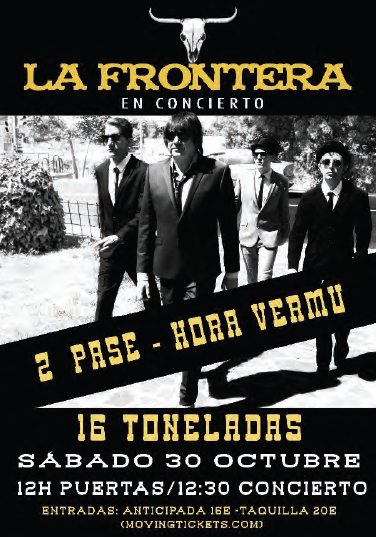
In 2020, the world was hit by a pandemic. Borders closed, and it was forbidden to go outside without a valid reason or to meet up in person. These were particularly tough times for creative people. All concerts, festivals, and various public events were canceled. Yet this situation also prompted more use of online resources and gave many musicians a chance to finally finish things they’d never had time for. Javier immersed himself in creating new songs. When the pandemic restrictions eased slightly, he began playing concerts in small venues with guitarist Harry Palmer, where people sat spaced apart and wore medical masks. At the same time, he started collaborating with director Juan Moya, who planned to make a documentary film about the La Frontera frontman for his anniversary.
By the end of 2023, Javier Andreu released a solo album called “The Man Who Went Out Too Much” (El hombre que salía demasiado). This album embraced the trendy style of retro-futurism (a vision of the future from the past). Musically, Javier returned to his roots: punk and western, classic rock and roll, and songs touching on personal themes. Some songs on the album are dedicated to his beloved woman and daughter, while others are tied to memories of Cersedilla.
Following the album, Juan Moya debuted the film “The Worst Hero of the Far West” (El peor héroe del Far West). The title comes from a La Frontera song. In the film, Javier shares memories of his childhood and youth, recounting how it all began. The film turned out to be very heartfelt and was well-received by audiences. In an interview about this project, Juan Moya said of Javier, “He’s spent forty years never leaving the playroom.”
What lies ahead includes a tour across Spain to promote the new album, concerts with La Frontera, and hopefully, new songs. Javier Andreu, the “worst hero of the Wild West,” is still “in the saddle.”
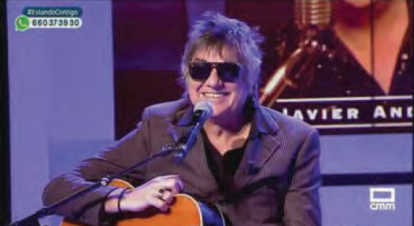
CODA
In Nino Bravo’s song “Un Beso y Una Flor,” there’s a line that goes “I’m leaving, but I promise you I’ll return tomorrow.” But as Juan Moya said, “La Frontera never returned because they never left.”
This article incorporates materials from the internet.
Photos from public sources.
Translation of song lyrics into Russian by the author, then from Russian to English by the translator.

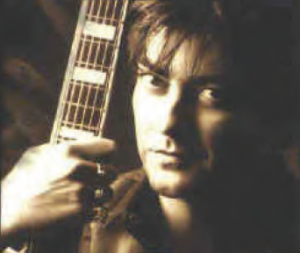
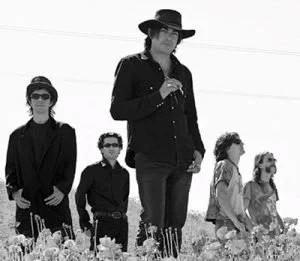
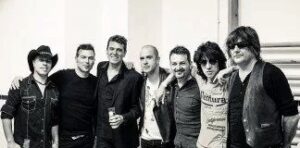
Speak Your Mind